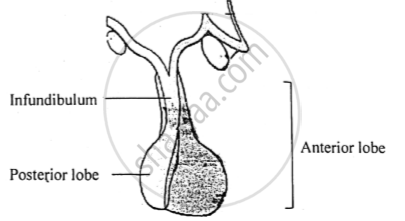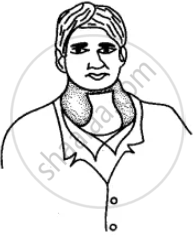Advertisements
Advertisements
प्रश्न
Growth hormone is important for normal growth. Justify the statement.
उत्तर
Growth hormone promotes growth of all the tissues and the metabolic process of the body. It influences the metabolism of carbohydrates, proteins, and lipids. It increases the rate of protein biosynthesis in the cells.
It stimulates chondrogenesis (cartilage formation), osteogenesis (bone formation) and helps in the retention of minerals like nitrogen, potassium, phosphorus, sodium, etc in the body. It increases the release of fatty acid from adipose tissue and decreases the rate of glucose utilization for energy by the cells. The hyposecretion of growth hormones causes dwarfism in children.
संबंधित प्रश्न
| Hormones | Target gland |
| Corticotrophin (ACTH) | ______ |
Give an example of gonadotrophic hormones.
Define the following:
Endocrine glands
Mention which of the statements are true (T) and which are false (F). Give reason in support of your answer.
There are two kinds of diabetes (mild and severe) related with two different hormones.
Compare the hormonal response with the nervous response with respect to their speed, transmission and the general nature of changes brought about.
The diagram give below represents an endocrine gland in the human body. Study the diagram and answer the following questions: 
Explain the term ‘Hormone’. What is the role of Tropic hormones in the human body?
Name the different endocrine glands found in the body of man.
Complete the following:
| Gland/Organ | Hormone | Function |
| (i) Stomach | __________ | __________ |
| (ii) Parathyroid | __________ | __________ |
| (iii) __________ | __________ | Lowers blood sugar level. |
| (iv) Adrenal medulla | __________ | __________ |
| (v) Pancreas (Alpha cells) | __________ | __________ |
| (vi) Testes | __________ | __________ |
Hormones are called ‘chemical messengers’.
Differentiate: Insulin and Glucagon.
Name the Following: Hormone secreted by corpus luteum.
Give the Technical Term: What are the substances that control the growth and development in animals?
Give the Technical Term: What are releasing hormones?
Give the Technical Term: Name the structure which produces testosterone.
Give the Technical Term: Name the glands which secrete the following hormone: Relaxin
Fill in the Blanks:
______ is called father of endocrinology.
Fill in the Blanks:
Nervous system and ______ are very closely related.
Some of the endocrine glands are shown by the guidelines.

(i) Name the glands 1 to 5.
(ii) Name any two endocrine glands which are not shown in the diagram.
(iii) Name one gland which is both exocrine and endocrine.
Given alongside are the diagrammatic sketches of some endocrine glands. Observe the figures and answer the following questions:

(i) Label the parts numbered 1 to 5.
(ii) Name the hormones secreted by (2) and (5).
(iii) Which chemicals in our body are greatly affected by hormones?
(iv) What is the chemical nature of hormones?
(v) Name the elements related to the functioning of hormones secreted by the structure (2) and (5).
The sketch below shows a certain condition in an individual:

(i) Name the condition.
(ii) What is the underlying cause of this condition?
(iii) Name two other conditions that could have resulted due to a similar cause.
(iv) Which hormone is required for iodine synthesis?
(v) Where is the thyroid gland located?
(vi) The hormone secreted by the thyroid gland is controlled from which hormone?
State the Function
Testosterone
State the Function
Oxytocin
Choose the Odd One Out
Choose the Odd One Out
Choose the Odd One Out
Choose the Odd One Out
Choose the Odd One Out
Choose the Odd One Out
The structure which connects the hypothalamus with anterior lobe of pituitary gland is the ______.
Differentiate hyperglycemia from hypoglycemia.
Which endocrine gland is present in males but not in females?
Select the right match of endocrine gland and their hormone among the options given below
| Column I | Column II |
| A. Pineal | i. Epinephrine |
| B. Thyroid | ii. Melatonin |
| C. Ovary | iii. Estrogen |
| D. Adrenal medulla | iv. Tetraiodothyronine |
Distinguish between Diabetes mellitus and Diabetes insipidus (endocrine gland concerned).
Choose the odd one out from series and write the category of the remaining terms:
